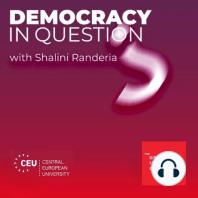2 min listen

Thomas Carothers on Democratic Backsliding in a Comparative Perspective
Thomas Carothers on Democratic Backsliding in a Comparative Perspective
ratings:
Length:
38 minutes
Released:
Jan 18, 2023
Format:
Podcast episode
Description
Guests featured in this episode:Thomas Carothers, is the Harvey V Feinberg Chair for Democracy Studies and Co-director of the Democracy, Conflict, and Governance Program at the Carnegie Endowment for International Peace. Trained as a lawyer, he served in the office of the legal advisor of the U.S. State Department before joining The Carnegie Endowment for International Peace. He is an expert on democracy and international support for democracy promotion abroad for human rights, governance, the rule of law, and civil society. Tom has published several critically acclaimed books, including Funding Virtue: Civil Society and Democracy Promotion, Promoting the Rule of Law Abroad, and most recently Democracies Divided: The Global Challenge of Political Polarization.He's also been a visiting member at the CEU, and is a member of the advisory board of our Democracy Institute in Budapest.GLOSSARY:What are the United States midterm elections?(02:27 or p.1 in the transcript)United States midterm elections are general elections that occur every four years in the middle of the U.S. presidential term. The election process mandated by Article I of the United States Constitution, by which all members of the United States House of Representatives and roughly a third of the members of the U.S. Senate are on the ballot, occurs every two years. (Currently, the House of Representatives has 435 members, and the Senate has 100.) Midterm elections get their name because they occur halfway through a president’s four-year term. In addition to elections for members of Congress, 36 states hold their gubernatorial elections during the midterm cycle. Many local races and citizen-generated initiatives also can appear on midterm ballots. In general, fewer Americans vote in midterm elections than in presidential elections. Whereas about 60 percent of eligible voters typically cast ballots in presidential election years, that percentage falls to about 40 percent for midterms. (Voter turnout in the 2018 midterm elections was 50 percent, the highest since 1914. Turnout for the 2022 midterms was estimated at 47 percent.) sourceWhat is the OECD?(07:26 or p.3 in the transcript)Organisation for Economic Co-operation and Development, international organization founded in 1961 to stimulate economic progress and world trade. Member countries produce two-thirds of the world’s goods and services. The convention establishing the OECD was signed on Dec. 14, 1960, by 18 European countries, the United States, and Canada and went into effect on Sept. 30, 1961. It represented an extension of the Organisation for European Economic Co-operation (OEEC), set up in 1948 to coordinate efforts in restoring Europe’s economy under the Marshall Plan. One of the fundamental purposes of the OECD is to achieve the highest possible economic growth and employment and a rising standard of living in member countries; at the same time, it emphasizes maintaining financial stability. The organization has attempted to reach this goal by liberalizing international trade and the movement of capital between countries. A further major goal is the coordination of economic aid to developing countries. Current OECD members are Austria, Australia, Belgium, Canada, Chile, Colombia, Costa Rica, Czech Republic, Denmark, Estonia, Finland, France, Germany, Greece, Hungary, Iceland, Ireland, Israel, Italy, Japan, Korea, Latvia, Lithuania, Luxembourg, Mexico, the Netherlands, New Zealand, Norway, Poland, Portugal, Slovak Republic, Slovenia, Spain, Sweden, Switzerland, Turkey, the United Kingdom, and the United States. source.What was the January 6 insurrection at the US Capitol?(15:32 or p.5 in the transcript)January 6 insurrection or January 6 U.S. Capitol attack was the storming of the United States Capitol on January 6, 2021, by a mob of supporters of Republican Pres. Donald J. Trump. The attack disrupted a joint session of Congress convened to certify the results of the presidential election of 2020, which
Released:
Jan 18, 2023
Format:
Podcast episode
Titles in the series (77)
Introducing Democracy in Question: Liberal democracies are under unprecedented strain from within and without. Join renowned social anthropologist Shalini Randeria and leading scholars for an exploration of the challenges democracies are facing around the world. Subscribe now! by Democracy in Question?